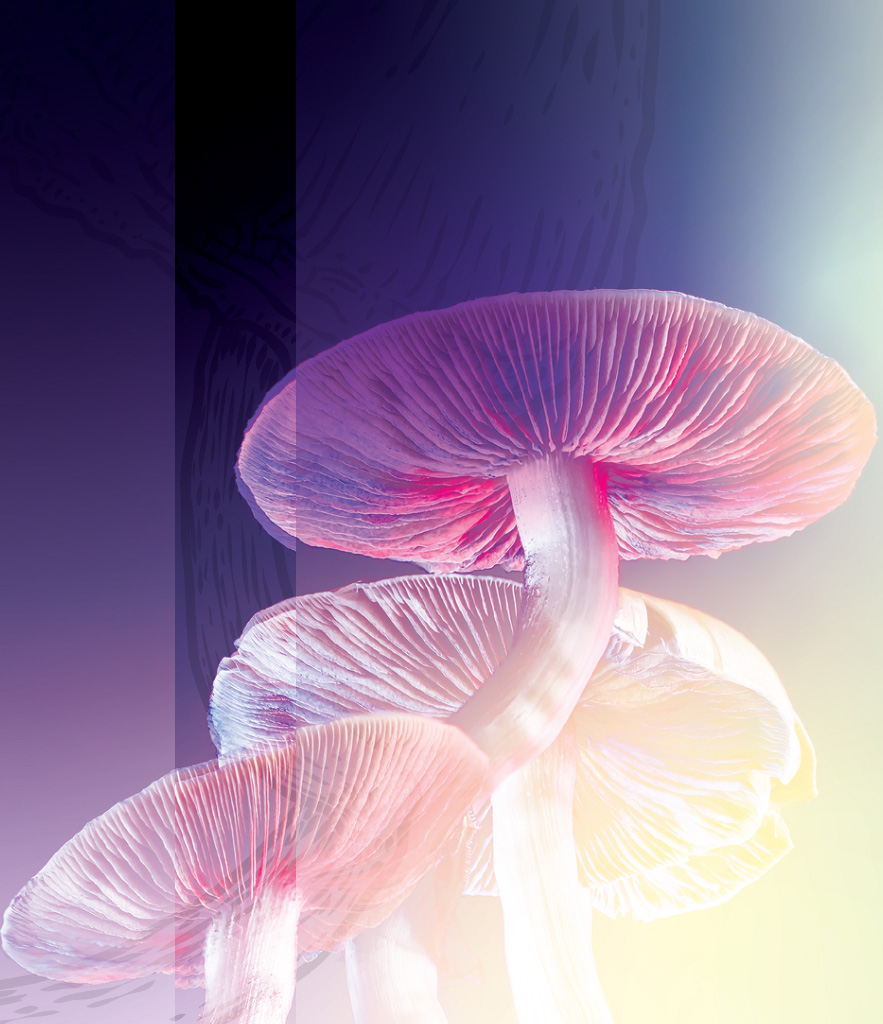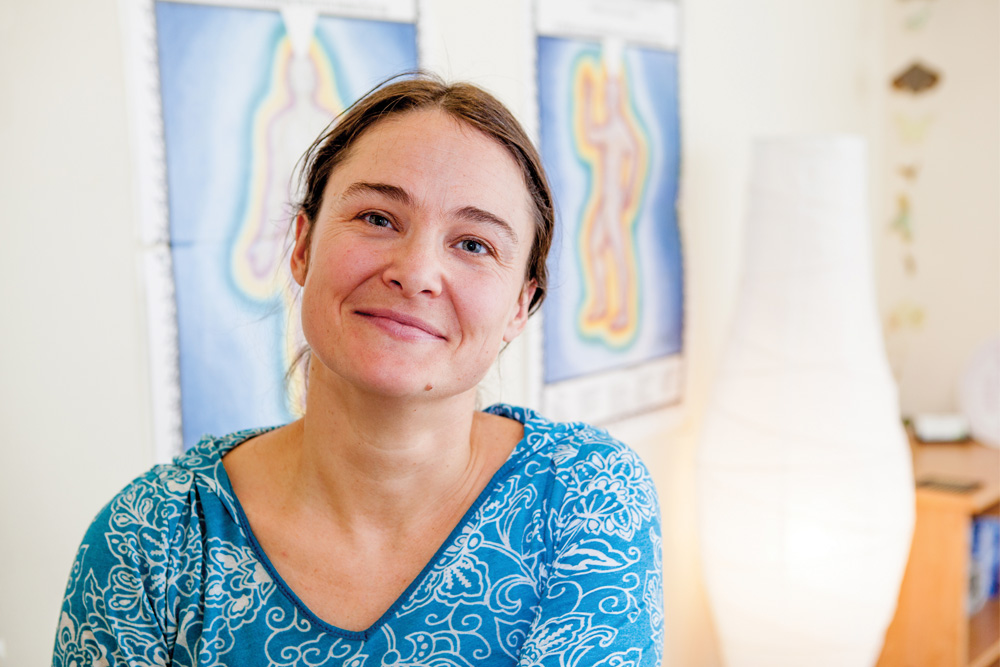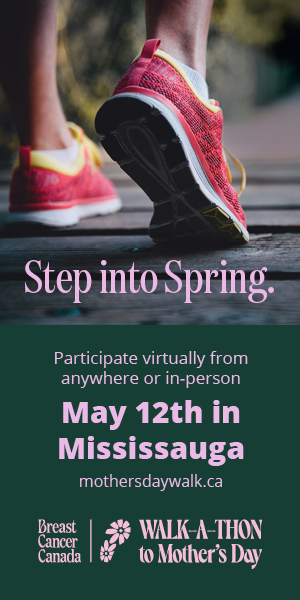National narcotics laws that are among the world’s most progressive, new treatment opportunities for patients and another drug-fueled gold rush for investors—welcome to Canada’s psychedelic renaissance.
by Viia Beaumanis

Daniel Carcillo would not be the first person to spring to mind as a poster boy for the psychedelic medicine movement. Born in King City, the Canadian hockey enforcer known as “Car Bomb” played in the NHL for a decade and won two Stanley Cups with the Chicago Blackhawks. But that success came at a huge personal cost. After seven concussions, he was diagnosed with traumatic brain injury (TBI).
“I couldn’t look at my phone because of the light sensitivity,” Carcillo told Forbes last year. “I had a newborn son and I wanted nothing to do with him. I wanted everyone to leave me alone.”
Headaches, insomnia, slurred speech, anxiety, depression, suicidal thoughts—his symptoms were shared with his best friend and Blackhawks teammate Steven Montador, who suffered from chronic traumatic encephalopathy (CTE), the degenerative brain condition caused by repeat head trauma. Montador died suddenly in 2015 at age 35.
A few months later, Carcillo, then 30, retired and became a full-time advocate for the devastating brain injuries that hockey players suffer—and a full-fledged public relations nightmare for the NHL when he joined a lawsuit against the League with hundreds of former players. The NHL settled, while assuming no liability. Motivated by the lack of accountability and resources, Carcillo’s search for effective treatment for the injuries that ended his career—and his friend’s life—would lead him to an unconventional healing practice: Magic Mushrooms.
Alternating hero doses of psilocybin, five grams or more, with maintenance microdoses (microdoses are amounts too low to cause hallucinogenic effects), Carcillo credits the treatment with reversing his head injuries and saving his life. A year and a half after the protocol, scans showed his brain had no abnormalities.
With himself as the winning case study, Carcillo co-founded Wesana Health. The Toronto-based company develops psychedelic drug therapies and is currently in development on SANA-013, a course of psilocybin it aims to have approved by the FDA and Health Canada.
Directly inspired by its CEO’s successful recovery, Wesana’s SANA-013 protocol utilizes large doses of psilocybin, followed by self-administered microdoses combined with the cannabis derivative cannabidiol (CBD), to provide long-term restorative benefits.
While an array of traditional and alternative health practitioners are excited about the effects of such psychedelic-assisted therapy, perspectives vary on how these drugs are best handled and administered.

Now based in Thornbury, psychedelic integration coach Mariya Garnet studied with shamans in the Amazon for years, eventually setting up Canto Luz, a female-run ayahuasca retreat in Peru. Working abroad, she’s seen psychedelics help people get off antidepressants, quit smoking or drinking, and repair relationships. She points to the substances’ facility for increasing brain neuroplasticity and allowing people to “directly access their subconscious mind, which can lead to deep transformation.”
“We enter a wider spectrum of awareness that allows us to understand things from a perspective that was not open to us before. A strong psychedelic experience can be life-changing, a mystical spiritual catalyst that turns many lives around,” explains Garnet. “ButI’d be very careful with using the word miraculous. Psychedelics are a tool that, when you understand how they work and how our subconscious works, can be used in an empowered, informed way, with a sense of agency over our own healing process.”
Citing depression, grief, addiction, all aspects of human relationships, finding one’s sense of self or purpose, and “nervous system resets” as aspects that psychedelics can address, Garnet adds that not everyone untangles the emotional roots of their pain or destructive behaviour patterns. “The medicine works in combination with its own effect, physiological and spiritual, and a person being ready for change and willing to go on the inner journey of inquiry. Intention is everything in this work.”
Garnet’s caveats about the West’s expanding embrace of psychedelic therapy are myriad. Chiefly, that, “Preparation and integration ensures that the medicine’s work actually sticks,” which is something she has a hard time imagining with “psilocybin produced in labs and certified by white people administering it in clinics at unaffordable prices.” That’s the biggest problem Garnet has with the present process—the colonization of indigenous medicines.
“We need to develop a path for shamanic traditions, and the people who have decades of experience and training. And to understand that spirituality is part of a healing process—it’s not just an isolated chemical.”
At the same time, having decriminalized such substances for therapeutic use, Canada is opening up access at a steady, if highly regulated, clip. In January 2022, Health Canada unveiled its Special Access Program (SAP), which allows licensed health practitioners—for example psychiatrists—to request restricted narcotics like psilocybin, LSD, DMT and MDMA as therapeutics for patients for whom conventional treatments have failed. An ensuing amendment to the regulation was granted only for psilocybin and MDMA, essentially limiting applications to those two substances.
On the other hand, ketamine, a fast-acting anesthetic that became a well-known party drug, has been legal to medical professionals in the U.S. and Canada for 50 years—but only in the last decade has it become a go-to treatment for depression and anxiety. Until 2018, Canadians had to hop the border to visit private clinics in America. Today, ketamine-assisted therapy, administered intravenously, is available nationwide; however, since it’s not covered by OHIP, the costs run in the thousands. There is, however, at least one publicly-funded program at Toronto’s St. Michael’s Hospital that treats patients free of charge.
Legalizing marijuana and relaxing regulations on everything from psilocybin to MDMA (a.k.a. ecstasy) for therapeutic or personal use, Canada’s 21st century narcotics policy is among the world’s most progressive. In 2022, the government announced a three-year trial period in B.C. to test-drive the decriminalization of MDMA, opioids, cocaine and methamphetamine for personal use in amounts at or below 2.5 grams. At the same time, the country has licensed manufacturers like Psygen and Filament Health to supply psychedelics for SAP requests, and many companies have cropped up to assist physicians in facilitating access to psychedelic-assisted care. These include TheraPsil and Numinus in B.C., New Earth Therapy in Saskatchewan, Toronto’s Field Trip Health and the nationwide Roots to Thrive.

Like the weed gold rush kicked off by Canada’s 2018 legalization of cannabis, the emerging field of therapeutic psychedelics has ballooned into Big Business. Companies like Wesana Health, MindMed, Compass Pathways and Field Trip Health are among a new stratum of stock market issues raising billions on the promise of psychedelic wellness. Funding everything from drug development to healing retreats, potential backers can weigh their options at websites such as Psychedelic Invest, which bills itself as “a resource for those looking to invest in the burgeoning psychedelic industry.”
“Out of all the sectors I’ve invested in, in this last year, that’s my highest return,” said Canadian financier and Shark Tank star Kevin O’Leary, in an interview with the Compound Interest podcast in October 2022, of his investment in MindMed, Compass Pathways and others. “They’re all doing narcotic trials with the FDA. Those stocks are up from the seed round, 700 percent plus.”
But not every psychedelic-investor is in it just for the money. Like Daniel Carcillo, former Bay Streeter Andrew Galloway took a more personal route to his business ventures. In 2021, Galloway co-founded Dimensions, a “psychedelic-assisted therapy company” whose flagship, boutique retreat centre occupies a pastoral, 40-acre lakeside compound in Ontario’s Algonquin Highlands.
“I helped co-found Dimensions because I did everything to recover from crack cocaine addiction, including six months of rehab, 12-step programs and group and individual therapy. Although I enjoyed abstinence, I never truly healed,” says Galloway. “When I was introduced to plant medicine, I gained new perspectives on my traumas, my life and the world around me. I was able to move through blockages that talk therapy couldn’t break. I became me again. I was finally truly free.”
After getting sober, Galloway quit finance to retrain as an addiction therapist. Advancing to vice-president at GreeneStone Muskoka, an inpatient drug and alcohol treatment centre, he was later appointed national director of Edgewood Health Network, where he oversaw 10 addiction centers, and met Edgewood founder and CEO Chris Dawson, with whom he’d go on to partner at Dimensions.
“I wanted people to experience the healing that I had, but recognized most wouldn’t travel to the jungle to do so,” Galloway explains of the motivation behind Dimensions, which he describes as a “safe, luxurious setting with a program that honours the old and new, based in neuroscience and the ancient wisdom of the plants.”
Visitors to Dimensions stay in one of 15 luxury cabins, with access to all the wellness bells and whistles. Equipped with five registered psychotherapists and a dozen practitioners specializing in everything from reiki, massage and acupuncture to yoga, meditation and breathwork, the property boasts vast grounds for hiking, biking, canoeing, swimming and cross-country skiing. A gourmet cuisine program is overseen by Miriam Echeverria, formerly chef de cuisine at Toronto restaurants L’Unità Enoteca and Greta Solomon’s.
For the time being, until Canadian regulation fully opens up—which the founders anticipate, given their expansion plans—Dimensions works with the cannabinoids THC and CBD at its Canadian property, while hosting its psilocybin-assisted therapy retreats under its Ascend program at sister properties abroad, where the protocol is wholly legal.

“It’s integral to do research and have a solid relationship with whomever is leading you through this journey.”
Galloway emphasizes that Dimensions supports a healing process that goes beyond the retreat experience alone: “I understood the importance of preparation and integration, and the effects of not doing so. This is why the journey with Dimensions starts a month before you arrive and is followed up with groups long after you leave. We want people to heal—not manage.”
Asked about Daniel Carcillo’s SANA-013 model, which follows psilocybin-assisted therapy with microdose maintenance, Galloway says he can’t speak to self-administration as it goes against current laws, but he’s very enthusiastic about Wesana Health’s research and is looking forward to the results of their clinical study in 2023.
Of course, as happened with cannabis, common practice is moving faster than the law. Microdosing in Canada is barely unlawful these days; and you need not travel internationally to purchase psilocybin. Retail vendors, walk-in or online, are easily accessed across the country. Billing itself as the country’s first “medical psilocybin dispensary,” Zoomers in Vancouver has been operating freely for two years—$10 for a gram to over $200 an ounce, plus psilocybin-infused gummies, tinctures and beverages. The same can be said for Shroom Wave dispensary in Barrie, Ontario. Google “mushroom shops Montreal” and you’ll be directed to numerous locations, including The Fun Guys.
Still, the legality of selling mushrooms exists in a grey zone and the law is enforced arbitrarily. In November 2022, Toronto’s first mushroom shop, Shroomyz on Queen West, was raided by police who fined and arrested staff. Two weeks later, a second raid at Fort York apprehended six more individuals running a separate operation. This, despite the fact that Toronto, like Vancouver, is keen to decriminalize drugs for personal use. In January 2022, Toronto applied to Health Canada for an exemption on all “personal drugs” under the Controlled Drugs and Substances Act immunity. A year later, there has yet to be a ruling.
Back in Thornbury, Kara Davison, a homeopathic doctor and owner SoulShine Alchemy, which specializes in “integrative healing modalities” from nutrition to energy work, believes—like a growing number of healers, therapists, scientists, and doctors—that psychedelics are to be welcomed as an invaluable wellness tool.
“Adults should be able to choose what they put in their bodies for healing,” Davison says. “It’s frustrating that pharmaceuticals are blanketly accepted, but plant medicine is not, though it has a scientifically documented success rate for emotional, mental, physical and spiritual wellness.”
Nonetheless, Davison has qualms about who is providing what. “I see people offering these services and not being in a place of full integrity, or their own inner work, which can lead to an experience that’s not amazing. Plant medicine allows us to see and feel things that we, perhaps, have never been able to access before. It’s integral to do research and have a solid relationship with whomever is leading you through this journey. Plants are powerful and need to be respected.”














